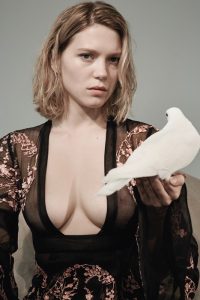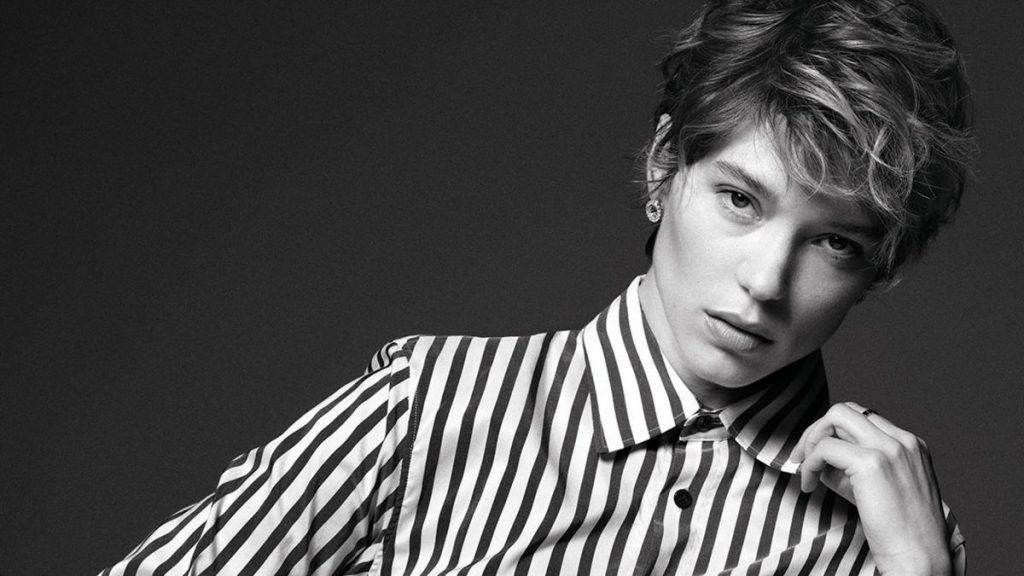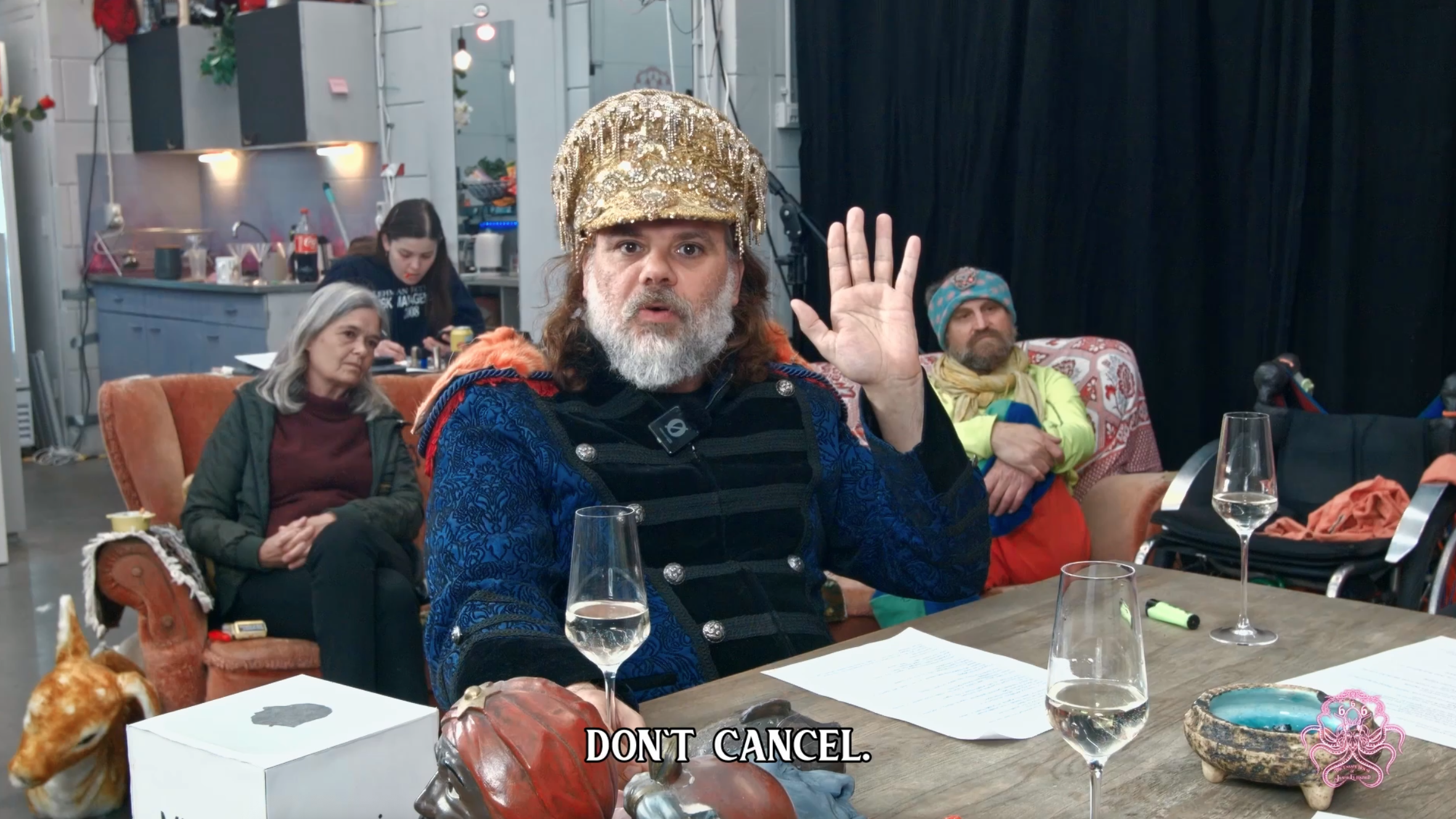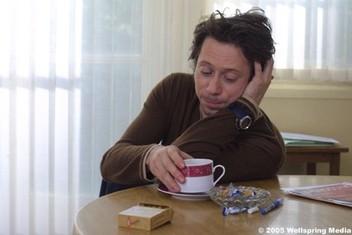Lea Seydoux follows in a long line of sulky, petted lip and iconic French actresses, of which there are quite a few – I would argue that she’s already up there with the likes of Catherine Deneuve and Juliette Binoche. Seydoux is a famed art-house actress (The Lobster, Blue is The Warmest Colour) with a penchant for staring in blockbusters (James Bond). Here, we discuss her new movie Deception, ‘a profession of faith’ based on the eponymous Philip Roth novel, and her latest collaboration with the brilliant and prolific director Arnaud Desplechin.
The softness of your voice in Deception is striking, almost hypnotic, from the opening scene where you are facing the camera. Was it a given from the start?
I have had few such a talkative roles in my career, moreover with such demanding text. Here the words had to be expressed incisively and quickly. We surely all have several voices according to different periods and situations in life. My voice in Oh Mercy! was clearly different from the one I have in Deception. In this film it is closer to mine in life.
You all seem to have an erotic relationship with the text in this film…
This comes from Arnaud, who has a very close relationship with literature. I think that words, language, literature are essentially erotic. I am convinced that creation in general has a close relationship with eros. It’s a libidinal transformation. And this is the case in Deception. Throughout his films Arnaud narrates feelings supported by the text.

It is also a sensual film, as close as possible to faces and bodies. Did you feel enveloped by the camera and the light?
I wasn’t exactly aware of the work the camera was doing while I was acting, but I loved working with the DP, Yorick Le Saux, who brought so much energy. There was such a special energy on this shoot. When you work with Arnaud, you want to espouse his cause. The actors he directs are thrilled on set. At his side, we feel transcended. He manages, with great youthfulness, to infuse a childlike excitement on set. His enthusiasm is contagious. He has fire in him and manages to communicate it to you. It’s as if he was handing us the torch. Then it’s up to us to seize it and make it blaze. Under his gaze we want to give the best. Arnaud inspires me enormously. In addition, he has the gift of choosing subjects that fascinate me.
Can you say more?
I like the way he talks about feelings. I especially like his viewpoint, his subjectivity. At his side, I feel I’m learning as much about cinema as about life, one not being distinct from the other. Thanks to him I have understood that one thing always goes with its opposite. That is why he doesn’t blame his characters, even those whose behaviour is reprehensible. He is always looking for their humanity. This was at the very heart of Oh Mercy! And it’s also the case in Deception. We can discuss the fact that adultery is immoral, but Arnaud films the love between my character and Philip. He always manages to make humanity triumph. His films never moralize; feelings always prevail, which gives dignity to the characters. I think that’s wonderful.
What was your feeling when you read Arnaud Desplechin and Julie Peyr’s screenplay?
I had the feeling of understanding the film immediately. And it was the same thing on set: when Arnaud gave me directions, I knew instantly what he wanted, it was evident… Sometimes it only takes one sentence in a screenplay for you to understand the whole film, a sentence around which the film revolves. In this case, it’s the final sentence, when my character says to Philip: “Because it was so tender…. unless I was mistaken.” He tells her no, she wasn’t mistaken. The whole film is in these two sentences, there’s no misunderstanding, tenderness did exist between the two of them. This sentence is related to the beginning of the film, where she asks him if he feels the same way she does. There are often misunderstandings in love. Here, both of them agree at the end: they did understand each other. By the end of the script, I was in tears! And I was in the same state when I played that scene. Our world cruelly lacks tenderness. Yet tenderness has to do with giving, with generosity. It’s overwhelming. And there are many such scenes in the film.
Were you familiar with Philip Roth’s world before shooting this adaptation?
I discovered it thanks to Arnaud. Roth is both vulgar and poetic. It seems to me that paradox runs through his oeuvre. This is probably why he is so fascinating to so many.
Did you work differently with Arnaud Desplechin on this film than on the one before?
I was almost more intimidated on Deception than on Oh Mercy! It seems to me that it was the opposite for Arnaud. I thought he was more confident on this one.
We perceive you as a tightrope walker in this film, constantly between two states, often overwhelmed by emotion…
I played this woman as if she was on the edge of a precipice and that’s how I felt on set. I was very shy during this shoot. I was so exposed… My character offers herself: this woman is in love. You feel very vulnerable when you’re in love. Because you want to be loved in return, you expect something. So I felt very fragile. My smiles are a way of masking my distress and emotion. Playing a lover is daunting.
What did you tell yourself about your character, who has no first name? Did you secretly give her a name?
In the screenplay she’s referred to as “The Lover”. It’s as if the characters were conscious of being characters… Because apart from Philip and Rosalie, no one is named in the story. Philip is like a sun around which everyone orbits. My character is neglected by her husband. We sense a great loneliness in her. She is a woman who doesn’t work, she’s financially dependent on her husband and therefore not free. “Without income you don’t have dignity,” she says. This sentence summarizes her situation, her state. I see her as an imprisoned woman. Her lover is her escape.
Did her sophisticated look, her meticulous outfits, her stylish hair help you find the core of her character?
I blended with this character quite naturally. I could dress like her in life. I wear some of my clothes in the film and bought some of the costumes after the shoot! The costume designer, Jürgen Doering, who has worked for Saint-Laurent, has beautiful taste. I loved wearing the clothes in the film, I felt very at ease in them. They are both chic and comfortable.
What kind of acting partner is Denis Podalydès?
He is firstly a man with whom I absolutely love to have conversations in between takes. We got on very well. He is as inspiring as Arnaud can be, and like him knows how to open up new perspectives. He’s also attentive, caring, strong. He is a theatre actor, his feet on the ground, he’s earthy. This was precious to me, as I was playing a febrile character.
Did Arnaud Desplechin direct you together?
He gave each of us different indications. Arnaud is great actor’s director, the greatest perhaps. Being directed by him is an immense pleasure. He is as intelligent as he is sensitive.
Denis Podalydès says he had the feeling that you were always one step ahead of him…
Is it because I never know what I’m going to do before the camera starts rolling? It can be destabilizing for my partners. I can go through peaks and abysses, which no one is aware of but me. I feel like a wild animal, one that hasn’t allowed itself to be tamed and which, emotionally speaking, has no reference point. Like many actors, I have a lot of instinct, but I’m also scared, even if I often feel comfortable on a set… although sometimes not. So I too am one thing and it’s opposite!
Were you inspired by the sets, the 80s accessories?
The sets are sensual and vibrant. I liked their “French charm”, while the action is set in England. Arnaud embodies French elegance!
Did this experience trigger some inner change in you?
I feel as if this was my first role as a woman and that I am in synch with my age, with my own life. I wouldn’t have been able to play this part five years ago. My experience in life nourished me for this film.


